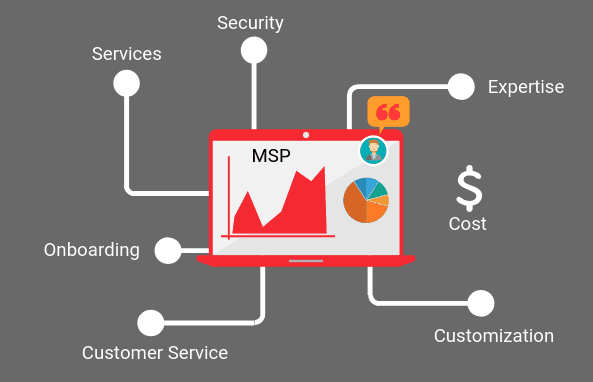
MSP Guide (Image by People Scout)

MSP Guide (Image by People Scout)
This MSP guide is designed to help you make an informed decision when selecting an MSP.
This guide provides insight into how MSPs can manage and streamline IT operations and provide adaptable solutions to changing technology landscapes.
The guide aims to provide IT decision-makers with the knowledge and understanding to select an MSP that meets their company’s specific challenges and objectives.
Managing IT infrastructure and systems efficiently and securely can be challenging for businesses.
MSPs with specialized expertise manage and maintain a company’s IT operations.
They tackle the challenges of keeping IT systems running efficiently, up-to-date, and secure. MSPs are essential in a world where technology is constantly changing.
MSPs enhance business efficiency and bring innovative solutions, keeping companies ahead of technological advancements.
MSPs serve as strategic partners. They help businesses grow and succeed through expert technology management.
Many IT decision-makers struggle to ensure their organization’s IT services meet current needs and align with their business objectives.
To effectively assess business needs, you must deeply analyze your existing IT infrastructure, identify areas needing improvement, and understand the specific technological drivers of your business.
Working with a Managed Service Provider (MSP) whose services align with your strategic goals will help you on this journey.
Identify the critical areas where an MSP’s expertise can add significant value to this process.
Whether it’s enhancing cybersecurity measures, streamlining cloud services, improving data management or providing reliable technical support, the goal is clear: find the MSP whose capabilities perfectly align with the areas critical to your company’s progress and operational effectiveness.
The conclusion of this process for IT decision-makers is the strategic matching of the organization’s specific IT needs with the precise services offered by an MSP.
This partnership is more than just a collaboration; it’s a tactical move to leverage technology to advance the company’s broader goals.
The outcome? Improved operational efficiency, strengthened security, and a path towards overall business expansion and advancement.
When choosing an MSP, it’s essential to consider a few key factors to ensure they fit your business needs well.
First and foremost, the expertise of the MSP is essential.
It is necessary to choose an MSP with a strong history in the precise IT services your business demands, whether that includes cloud management, cybersecurity, or network support.
Their aptitude to provide adept solutions customized to your specific challenges is essential.
Industry experience is another crucial consideration.
An experienced MSP in your industry will thoroughly understand your specific challenges and needs, allowing them to deliver more tailored and efficient IT solutions.
Additionally, scalability is crucial, as your IT requirements will evolve as your business expands.
A responsive MSP that can adapt its services to your changing demands will be a valuable ally in driving your business’s growth.
This means finding an MSP that can tailor their services to accommodate your growing business, guaranteeing you all the necessary IT support.
It is also critical to evaluate MSPs’ cybersecurity protocols and compliance practices.
The appropriate MSP should provide strong protection against digital threats and conform with industry-specific compliance requirements.
Evaluating the MSP’s security practices and compliance with industry standards should be part of your evaluation process.
It is essential to understand how the MSP secures data, handles breaches, and continually monitors and updates its security protocols.
A reliable MSP should have a well-defined and well-developed cybersecurity strategy that includes everything from regular security audits to employee training and incident response plans.
It’s also important to consider the MSP’s compliance with the standards applicable to your industry.
This demonstrates their commitment to maintaining high security and understanding your industry’s specific regulatory requirements.
Organizations often encounter uncertainties in delivering IT services before establishing Service Level Agreements (SLAs).
There is ambiguity surrounding which services will be provided, the standards they must adhere to, and the criteria for measuring service quality.
This lack of clarity can result in misaligned expectations and operational inefficiencies.
Envision a scenario where every aspect of your IT service delivery is precisely defined and aligned with your business requirements.
Service response times, system uptime, and protocols for issue resolution are all specified in our SLAs.
The documents also outline performance metrics, including response speed, maintenance frequency, and support quality, to allow for a clear understanding and management of IT services.
These SLAs serve as a detailed, comprehensive document that specifies the exact services an MSP will provide, establishes standards for service delivery, and defines the metrics for service evaluation.
Understanding and aligning these SLAs with your organization’s operational needs is crucial for decision-makers.
Doing so ensures that IT services are designed to meet the business’s specific needs and provides a framework for accountability and efficient service delivery.
This alignment is essential to boosting the efficiency and effectiveness of your organization’s IT operations.
In today’s high-stress business environment, the need for scalable IT solutions isn’t just important; it’s critical.
Your business is multiplying, and your IT infrastructure needs to keep pace. You risk being left behind in an increasingly competitive business environment without scalable IT solutions.
Your one-stop solution is to choose an MSP that offers outstanding scalability in its services.
This goes beyond expanding current services; it’s about having an MSP guide that grows with your business, providing innovative and adaptable IT solutions.
As your business grows, your MSP stands by, guaranteeing your IT requirements are fulfilled at every stage.
The value of a scalable MSP partnership is enormous. Not just for managing more extensive data sets or increasing cybersecurity but also for ensuring that your business has the IT support it needs at all times.
No need to go through interruptions, switch to new providers, or overhaul your IT systems. A scalable MSP provides a future-proof plan, making it an essential investment for your expanding business.
Effective communication and collaboration with a Managed Service Provider (MSP) is crucial.
As businesses rely on technology, transparent and timely communication with your MSP is critical.
Communication in an MSP partnership is about transferring information and creating a two-way dialogue where feedback, updates, and ideas flow without interruption.
Effective communication and a strong support system are critical differentiators in a successful MSP partnership.
When evaluating potential MSPs, examining their approach to communication and collaboration with clients is essential.
Seek out an MSP that prioritizes transparent communication, provides multiple channels for interaction, and delivers a responsive and efficient support structure.
This approach ensures your company’s IT needs are fulfilled, anticipated, and strategically planned.
This approach also positions your MSP as an indispensable ally in your business’s expansion and prosperity.

Leveraging the latest technology advancements can be the difference between leading the market and lagging.
An MSP that actively embraces and integrates new technologies can propel your business forward, ensuring you stay ahead in a rapidly changing digital world.
The role of an MSP in guiding organizations through technological advancements lies in their expertise and foresight.
They are technology partners who understand the nuances of emerging trends and can implement these innovations in a way that aligns with your business goals.
Choosing an MSP committed to innovation means having a partner dedicated to exploring and applying new technologies to optimize your business operations.
They bring cutting-edge solutions to your doorstep, offer insights into how these advancements can benefit your business specifically, and help seamlessly integrate new technologies into your existing systems.
That MSP’s commitment to innovation ensures that your business remains competitive, efficient, and ready to capitalize on new opportunities.
Decision-makers should prioritize MSPs that not only keep up with technological trends but are also proactive in applying them for the betterment of their client’s businesses.
The need for businesses to partner with MSPs is driven by the rapidly changing technology landscape, where staying ahead of digital trends can significantly impact business success.
Strategic MSP collaborations have transformative potential and are essential to modern business success.
For this reason, the need to work with MSPs to achieve business goals is illustrated through a series of success stories and case studies.
These real-life examples demonstrate how partnering with the right MSP has changed businesses’ operations, improved efficiencies and achieved strategic goals.
These success stories show how working with an MSP can be transformative, whether implementing cutting-edge technology, optimizing IT operations or improving cybersecurity measures.
That’s why choosing with MSP guide that aligns with one’s business objectives is crucial for decision-makers.
This collaboration allows businesses to meet today’s technology needs and prepare for tomorrow’s challenges.
This kind of partnership can lead to significant improvements in operational efficiency, cost savings and, ultimately, the realization of long-term business goals.
Multi-stakeholder processes involve diverse groups, such as businesses, government, civil society, and academia, working collaboratively to address complex challenges, particularly in sustainable development.
The multi-stakeholder process in the managed service provider domain is a collaborative approach that involves various parties in decision-making.
These parties include the service provider, customers, government, civil society, academia, and sometimes third-party vendors.
All those parties work together to manage and optimize IT services for an organization.
Multiple parties provide input into decisions about IT services and strategies, ensuring a comprehensive approach to IT management.
This collaboration provides a comprehensive understanding of business needs from multiple perspectives.
Every stakeholder contributes unique insights, aligning IT strategies with the organization’s overall goals and operational necessities.
The essential advantage of this approach is delivering improved IT services and solutions.
By incorporating inputs from various stakeholders, IT services are tailored to meet business requirements and anticipate future needs, resulting in enhanced efficiency, productivity, and scalability.
Your business needs an MSP that can keep up and ensure that your IT infrastructure is solid and efficient as the digital world continues to evolve.
That is why one of the hallmarks of a reliable MSP is a deep level of specialization in various IT areas.
It’s important to note that the quality of a good MSP isn’t just about having a general understanding of IT. The statement we consistently reiterate throughout this MSP guide.
Beyond that, it’s about providing expert knowledge and customized strategies that perfectly align with your company’s unique goals and challenges.
This level of specialization and customization in IT service management is the difference in partnering with the right MSP.
Imagine a turbocharged business with increased efficiency, minimal downtime, and optimal use of the latest technology.
This is not just about maintaining your IT systems but improving them in ways that drive operational excellence and help your business grow and succeed.
A good MSP will guide and demonstrates expertise, reliability, scalability, strong security measures, effective communication, and a commitment to continuous improvement and innovation.
Choosing the right Managed Service Provider (MSP) is critical for your business’s success.
Navigating the complexities of MSP selection requires attention, as the right partnership can significantly enhance your business goals.
This guide distinguishes itself with a focused, comprehensive approach that builds on the strategic elements of MSP partnerships.
Selecting an MSP requires more than basic knowledge – it directs you toward a partnership that aligns with and enhances your business objectives.
This definitive resource was created specifically for the discerning IT decision-maker.
Employ this guide as a valuable asset in your journey towards MSP selection.
For those looking beyond guidance, Octobits offers an expert solution.
With its advanced platform, Octobits simplifies IT management through a unified dashboard, streamlined login systems, and efficient billing and reporting.
Integrations with industry leaders like Datto Autotask, Microsoft 365, Azure, AWS, CrowdStrike, and Proofpoint create a cohesive and optimized IT environment that caters to your unique business needs.
Octobits is a way to improve your IT infrastructure, not just a tool.
Engage with us to share your MSP experiences and queries and discover how partnering with Octobits can revolutionize your IT strategy.
Visit our website to see how our specialized services can drive your business forward in the constantly evolving digital world.